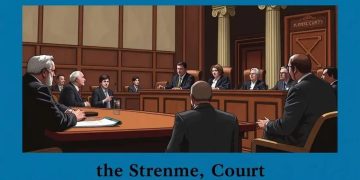Civil rights movements that changed society forever
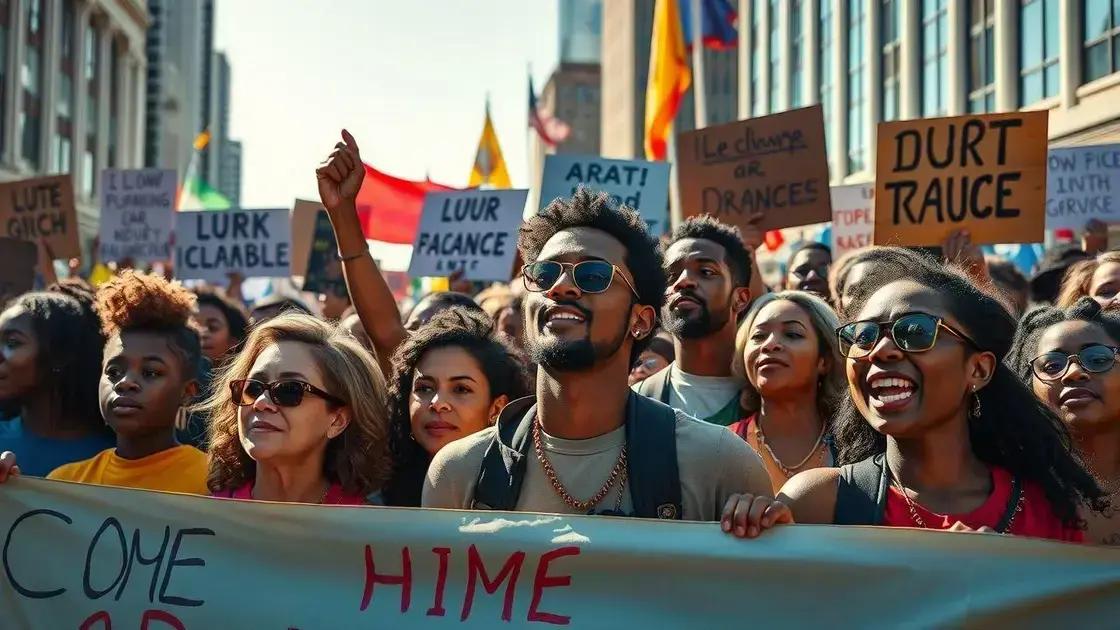
Anúncios
Civil rights movements are organized efforts aimed at achieving equality and justice, addressing discrimination, and influencing laws that protect marginalized communities worldwide.
Civil rights movements have played a significant role in shaping today’s society. From advocating for equality to challenging systemic injustice, these movements are vital for social progress. Have you ever wondered how their legacy continues to influence us today?
Anúncios
The origins of civil rights movements
The origins of civil rights movements can be traced back to a long history of oppression and the fight for equality. These movements emerged as a response to systemic discrimination and injustice faced by various groups. By understanding their beginnings, we can better appreciate their importance today.
Key Historical Events
Many critical events contributed to the rise of civil rights movements around the world. Understanding these events helps us see how the struggle for equality has evolved over time.
Anúncios
- The abolition of slavery in the 19th century
- The suffrage movement advocating for women’s voting rights
- Post-World War II human rights declarations
Each of these milestones inspired future generations to continue the fight against inequality. The civil rights movement in the United States, for example, gained momentum during the 1950s and 1960s as activists sought to end racial segregation and discrimination.
Influential Figures
A number of courageous leaders played significant roles in shaping the course of civil rights movements. Their dedication and passion for justice have left a lasting impact on society. Activists like Martin Luther King Jr., Rosa Parks, and Malcolm X became symbols of the struggle for equality.
Their efforts demonstrated the power of nonviolent protest and direct action, inspiring countless individuals to join the cause. By uniting diverse groups, these leaders helped amplify the message of the movements.
As we explore the roots of these significant movements, it is essential to recognize the ongoing legacy they have created. The fight for civil rights continues today, as new challenges arise and advocates strive for justice in various forms.
Key figures who made a difference
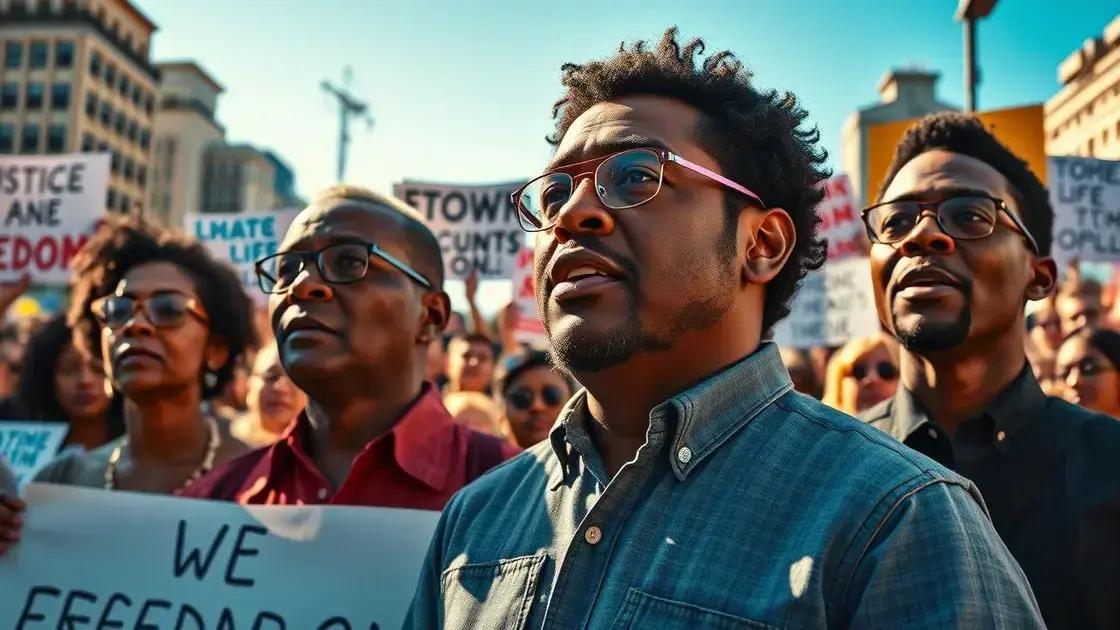
Throughout history, several key figures have played important roles in advancing civil rights movements. These individuals dedicated their lives to fighting for equality and justice, often facing great personal risk in the process. Their efforts have sparked change and inspired countless others.
Notable Leaders
Among the most significant figures are activists who stood out due to their leadership and vision. Notable leaders like Martin Luther King Jr. led peaceful protests, advocating for nonviolence in the quest for equality. His famous “I Have a Dream” speech remains a powerful testament to his dream for a harmonious society.
- Rosa Parks, known as the “mother of the civil rights movement,” made history by refusing to give up her bus seat.
- Malcolm X advocated for black empowerment and was an influential voice during the civil rights struggle.
- Harriet Tubman, although prior to many contemporary movements, was a crucial figure in the fight against slavery and played a significant role in the Underground Railroad.
These individuals made sacrifices to bring attention to racial injustice and inequality. Their determination and courage brought about pivotal changes in laws and societal norms.
Influence on Future Generations
The legacies of these key figures continue to inspire new generations of activists. Their stories are taught in classrooms and shared in communities to motivate ongoing efforts towards justice. Every year, events like Martin Luther King Jr. Day remind us of the ongoing struggle for civil rights.
As we reflect on their contributions, the influence of these leaders prompts us to consider our own roles in addressing inequality. Involvement in local advocacy, education, and community efforts can honor their legacies and push the movement forward.
Major milestones and events
The history of civil rights movements is marked by significant milestones and events that have shaped the struggle for equality. Understanding these moments helps to highlight the progress made and the ongoing challenges that advocacy groups face.
Important Milestones
Throughout the years, several pivotal events have served as turning points in the fight for civil rights. Each milestone represents a broader push towards justice and equality.
- The 1954 Supreme Court decision in Brown v. Board of Education declared racial segregation in public schools unconstitutional.
- The Montgomery Bus Boycott of 1955-1956 was a key protest against racial segregation in public transportation.
- The Civil Rights Act of 1964 prohibited discrimination based on race, color, religion, sex, or national origin, marking a significant legislative achievement.
These events were not just moments in time; they were catalysts for change that inspired countless individuals to join the movement. The courage displayed by activists during these milestones continues to resonate today.
Historical Events That Shaped Policy
Several protests and campaigns brought attention to issues of injustice and helped inform public policy. The March on Washington for Jobs and Freedom in 1963 was one such event where Martin Luther King Jr. delivered his iconic “I Have a Dream” speech.
This gathering highlighted economic inequality and racial injustice faced by African Americans and called for civil and economic rights. Similarly, the Stonewall Riots of 1969 played a critical role in the LGBTQ+ rights movement, challenging discrimination and advocating for equal treatment.
Each of these events not only fostered public awareness but also led to crucial changes in legislation and societal attitudes. They serve as reminders of the power of collective action in pursuit of civil rights.
The role of protests and activism
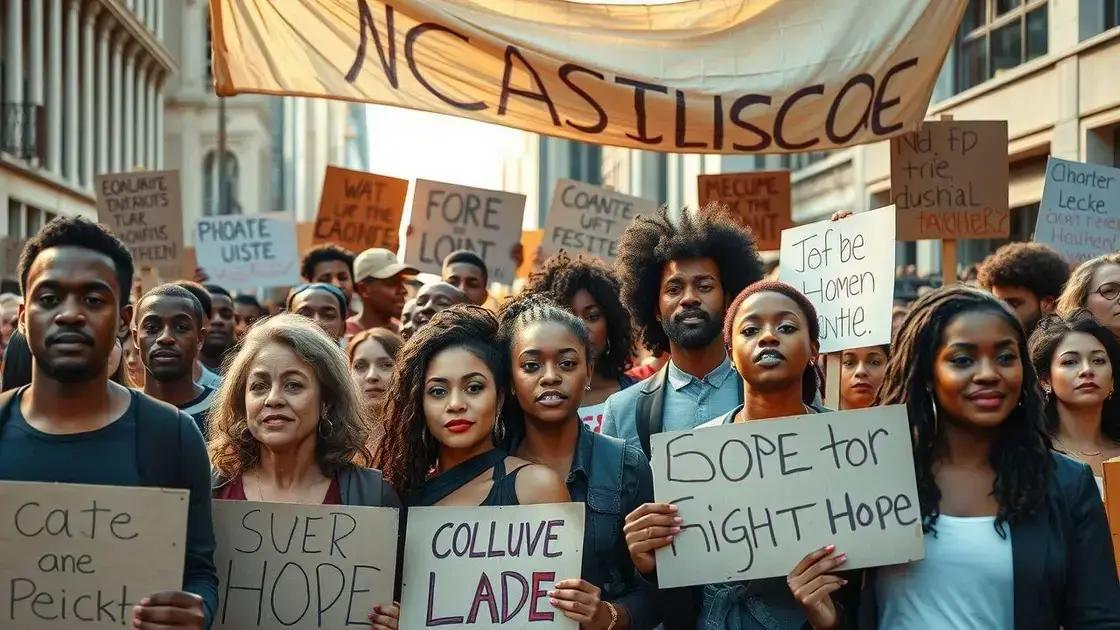
Protests and activism have been essential in advancing civil rights movements. They serve as powerful tools for raising awareness and demanding change. Through collective action, marginalized communities have been able to challenge injustices and make their voices heard.
The Power of Protests
Protests are a visible way for people to express their discontent and push for social change. Historical examples show how demonstrations can lead to significant legislative shifts. The Women’s March in 2017, for instance, highlighted issues like women’s rights and equality.
- Protests can unite diverse groups under a common cause.
- They draw media attention, which can amplify the message.
- Organized marches and rallies can influence policymakers.
This public display of solidarity helps to put pressure on those in power to address the needs of the people. Activists often work behind the scenes to plan these events, ensuring that they resonate with the public.
Activism Beyond Protests
While protests are highly visible, activism takes many forms. Grassroots organizing, community education, and social media campaigns are also vital components of the movement. Activists utilize various platforms to spread their message and mobilize support.
For example, social media has allowed activists to reach wider audiences faster than ever before. Hashtags like #BlackLivesMatter have galvanized support for racial justice, helping to inform and engage people globally. This shift towards digital activism complements traditional methods of protest.
Moreover, activists often engage in lobbying efforts to push for changes in laws and policies. They attend city council meetings, meet with lawmakers, and organize petition drives. These actions complement the more public-facing protests and help create long-term change.
How civil rights movements influence modern society
Civil rights movements have had a profound impact on modern society. Their influence can be seen in changes in laws, cultural shifts, and increased awareness of social issues. By examining their legacies, we see how these movements continue to inspire and shape our world today.
Legal Changes and Protections
Throughout history, civil rights movements have fought for legal reforms that protect individuals from discrimination. Landmark legislation, such as the Civil Rights Act of 1964 and the Voting Rights Act of 1965, established vital protections for marginalized groups.
- These laws outlawed discrimination in employment and public accommodations.
- They ensured voting rights for African Americans and other minority groups.
- The legal framework created by these movements continues to evolve to address new issues of discrimination.
As society changes, ongoing advocacy is essential to ensure that these protections remain strong and relevant.
Cultural Shifts and Public Awareness
The impact of civil rights movements is also evident in cultural shifts. Movies, books, and art often reflect the struggles and achievements of these movements, raising awareness and sparking conversations about equality and justice.
For instance, the portrayal of civil rights leaders in popular media helps educate younger generations about the past. Campaigns like #MeToo and #BlackLivesMatter show how the fight for equality evolves, connecting historical struggles to present-day issues.
These initiatives encourage dialogue about race, gender, and socioeconomic status, prompting individuals to reflect on their values and beliefs. As a result, many people are increasingly committed to social justice and equality.
In modern society, people continue to engage in activism through protests, social media, and community organizing. This grassroots mobilization echoes the efforts of past activists, ensuring that the fight for civil rights remains relevant and impactful.
Looking ahead: the future of civil rights
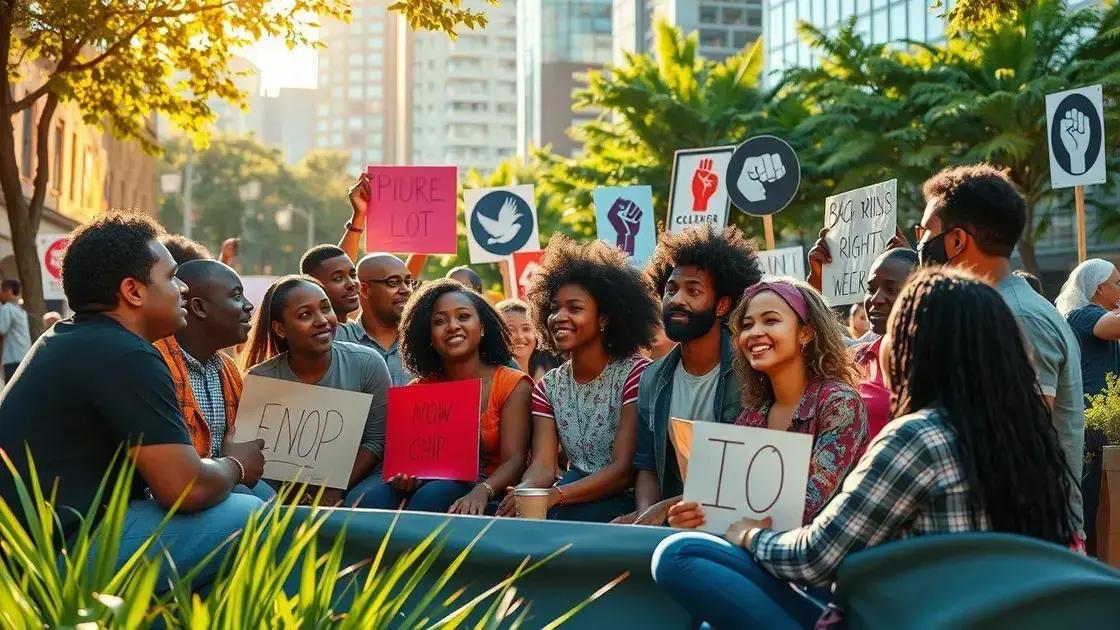
Looking ahead, the future of civil rights remains both hopeful and challenging. As society evolves, new issues arise that require continued advocacy and action. Understanding these potential challenges and opportunities can help shape a more just world.
Emerging Issues
New civil rights issues are gaining attention in today’s society. These include topics such as digital privacy, environmental justice, and gender identity rights. Each of these areas presents unique challenges that demand collective action.
- Digital Privacy: With the rise of technology, protecting individuals’ personal data has become critical.
- Environmental Justice: Communities facing disproportionate environmental hazards are calling for equitable solutions.
- Gender Identity Rights: Advocates are working to ensure that individuals are protected against discrimination based on their gender identity.
Each of these issues reflects the ongoing need for vigilance and advocacy to protect the rights of all individuals.
Importance of Education and Awareness
Education plays a crucial role in shaping the future of civil rights. Schools and communities must prioritize teaching the history and importance of civil rights movements. By doing so, they can empower the next generation to take action.
Awareness campaigns are also key to informing the public about ongoing issues. Utilizing social media and community events can engage more people in discussions about civil rights. Encouraging dialogue helps to break down barriers and fosters understanding.
As society continues to change, it is essential to remember that the fight for civil rights is ongoing. The legacy of past movements serves as an inspiration for current and future advocates. By standing together and raising our voices, we can work towards a society that values equality and justice for everyone.
civil rights reflects a commitment to achieving equality for all. Civil rights movements have inspired significant changes throughout history, shaping laws and cultural attitudes. The future depends on continued advocacy, awareness, and education. Together, we can build a society where everyone enjoys equal rights and opportunities, ensuring that the struggle for justice does not fade away.
FAQ – Frequently Asked Questions about Civil Rights Movements
What are civil rights movements?
Civil rights movements are organized efforts by individuals and groups to end discrimination and promote equal rights for all, regardless of race, gender, or other characteristics.
How have civil rights movements influenced laws?
Civil rights movements have led to significant legal changes, including the Civil Rights Act of 1964, which prohibits discrimination and has established protections for marginalized groups.
Why is education important in the context of civil rights?
Education helps raise awareness about civil rights issues and history, empowering future generations to advocate for equality and justice.
What are some ongoing challenges faced by civil rights movements today?
Ongoing challenges include addressing issues like digital privacy, environmental justice, and discrimination based on gender identity, which require continued advocacy and public awareness.



